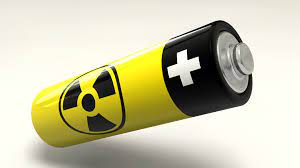A nuclear power battery, also known as a radioisotope thermophotovoltaic (RTPV) generator, is a compact device that converts heat released from radioactive decay into electrical power.

It contains a small amount of radioactive material, such as plutonium-238, which emits heat as it decays. This heat is then used to generate electricity through thermophotovoltaic cells, producing a continuous and reliable power source. These batteries are often used in space exploration, remote locations, and certain medical devices due to their long-lasting and efficient energy production.
Nuclear battery vs Lithium battery
The table below highlights some key differences between nuclear batteries and lithium batteries in terms of their power source, energy density, lifetime, environmental impact, applications, safety, and cost.
| Aspect | Nuclear Battery | Lithium Battery |
| Power Source | Radioactive decay of isotopes (e.g., Pu-238) | Chemical reactions in lithium cells |
| Energy Density | High energy density | Moderate energy density |
| Lifetime | Extremely long lifespan | Limited lifespan, degrades over time |
| Environmental Impact | Radioactive materials pose concerns | Less environmental impact, recyclable| |
| Application | Space missions, remote locations | Consumer electronics, electric vehicles |
| Safety | Requires careful handling due to radioactivity | Generally safe with proper usage |
| Cost | Higher initial cost, lower operating cost | Lower initial cost, variable operating cost |
Is Nuclear Power Battery Safe For Us?
Yes, nuclear power batteries are designed with safety in mind. The radioactive materials used, such as plutonium-238, emit low levels of radiation and are encased in protective layers. The design minimizes the risk of exposure to humans. Additionally, the compact size and robust construction of these batteries contribute to their safety.
Read Also : Human Xenomorph Hybrid
Impact Of Nuclear Power Battery in Future
1. Clean Energy Source: Nuclear power batteries can provide a continuous and efficient source of clean energy, reducing reliance on fossil fuels and lowering greenhouse gas emissions.
2. Long-lasting Power: Nuclear Power Battery has the potential for extended operational lifespans, offering a more sustainable and reliable energy solution compared to conventional batteries.
3. Space Exploration: These batteries could play a crucial role in powering long-duration space missions, providing a constant and high-energy source in environments where solar power may be limited.
4. Decentralized Energy Production: Small-scale batteries could enable decentralized energy production, bringing power to remote areas or serving as backup sources during emergencies.
5. Reduced Environmental Impact: Advanced nuclear technologies aim to minimize environmental impact through improved safety features, waste management, and decreased risk of accidents, making them a more eco-friendly energy option.
6. Base Load Power: Nuclear power battery can contribute to the base load power, providing a consistent output and complementing intermittent renewable sources like solar and wind.
7. Technological Innovation: Continued research and development in nuclear power can lead to technological innovations, potentially addressing concerns such as nuclear waste and safety issues.
8. Energy Security: Nuclear power battery can contribute to energy security by diversifying the energy mix, reducing dependence on specific fuel sources susceptible to geopolitical tensions.
9. Medical Isotope Production: Nuclear power batteries can support the production of medical isotopes for various diagnostic and therapeutic purposes, contributing to advancements in healthcare.
10. Job Creation: The development and maintenance of nuclear power technologies can create jobs in engineering, research, and other related fields, fostering economic growth.
